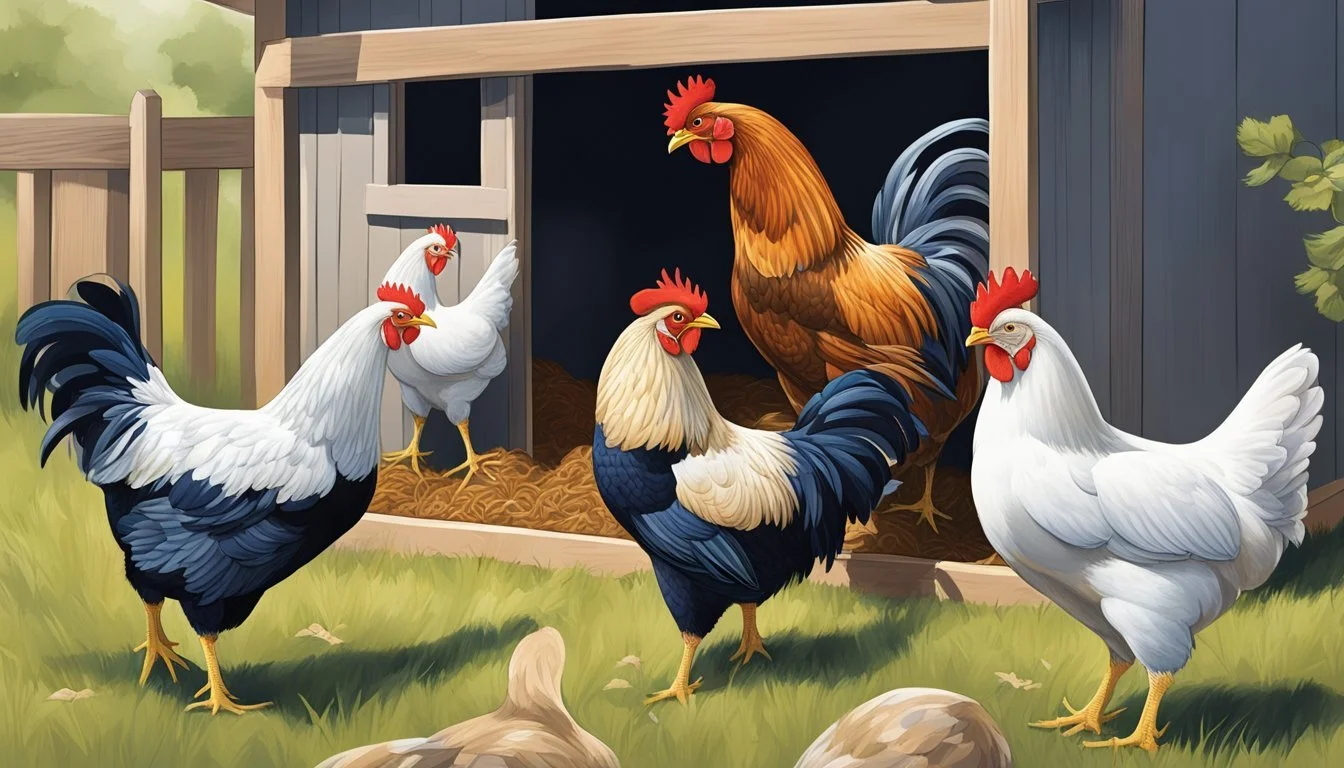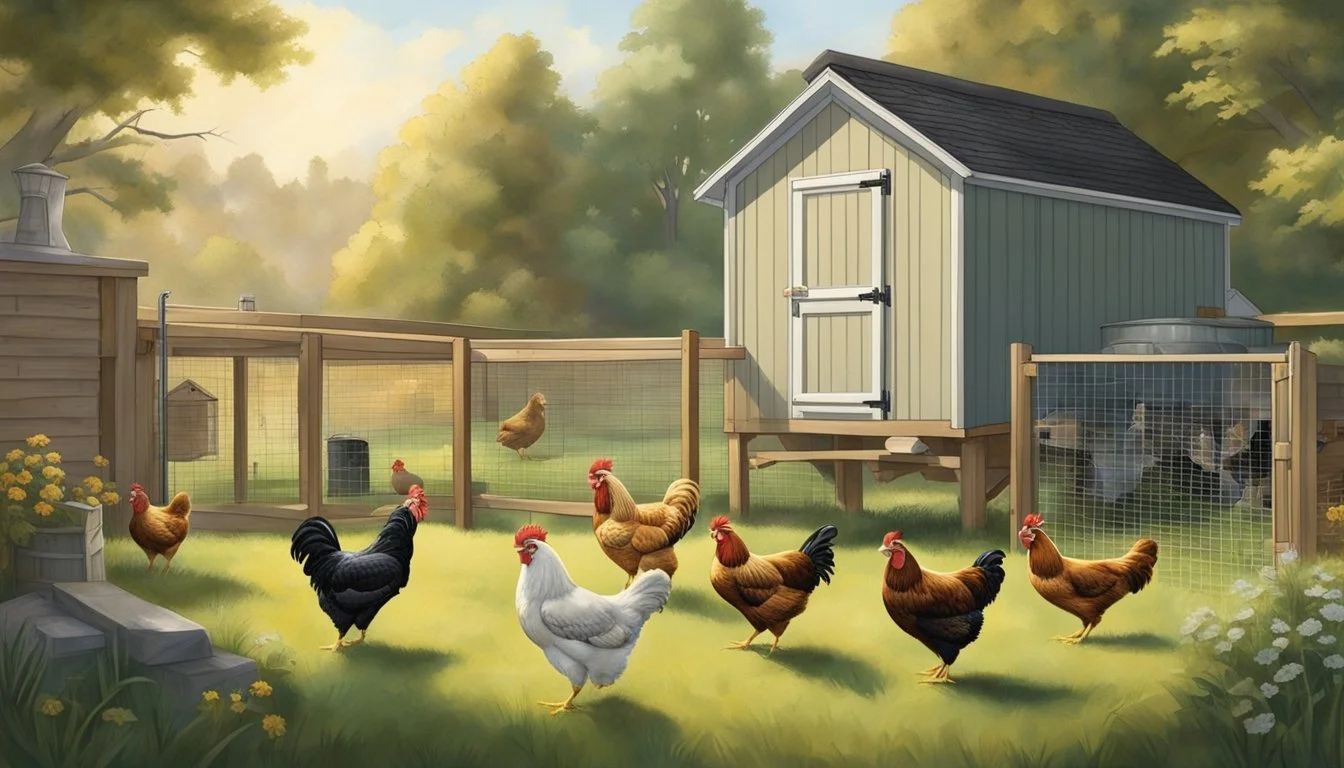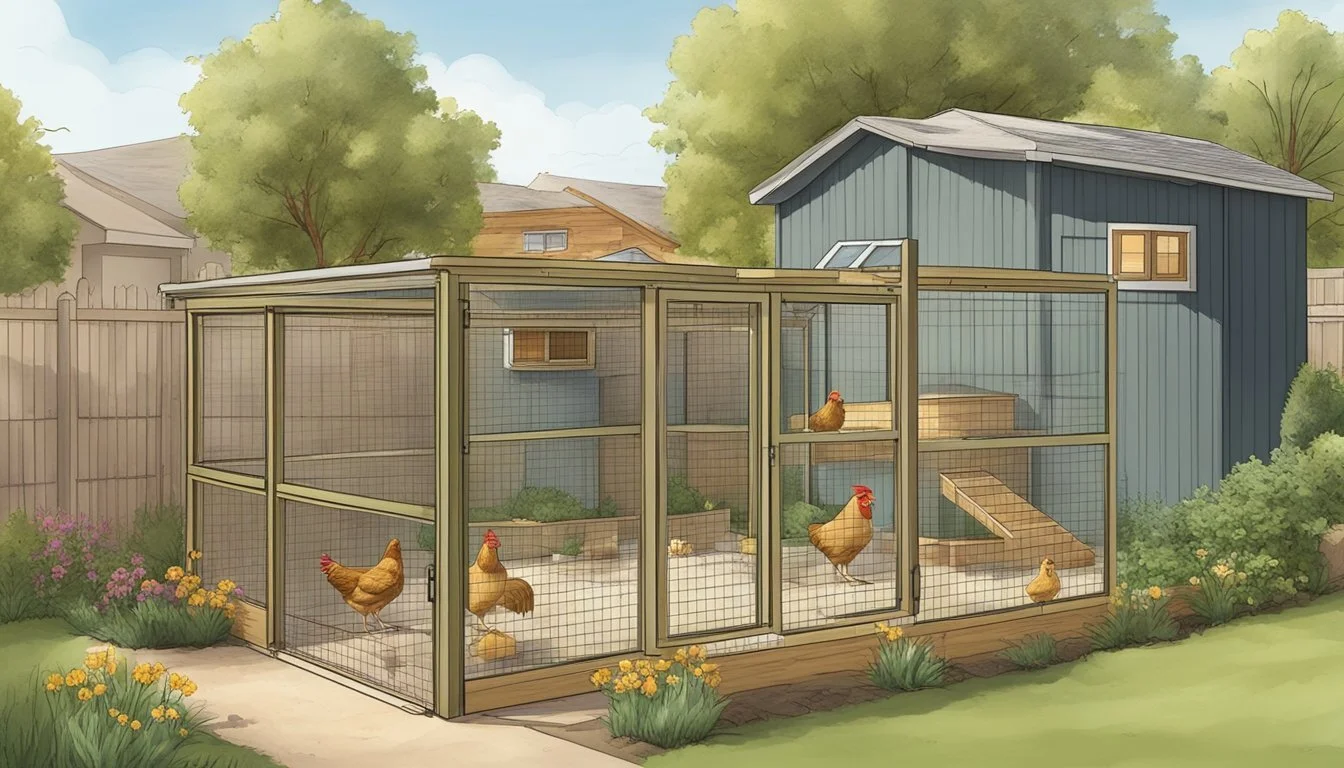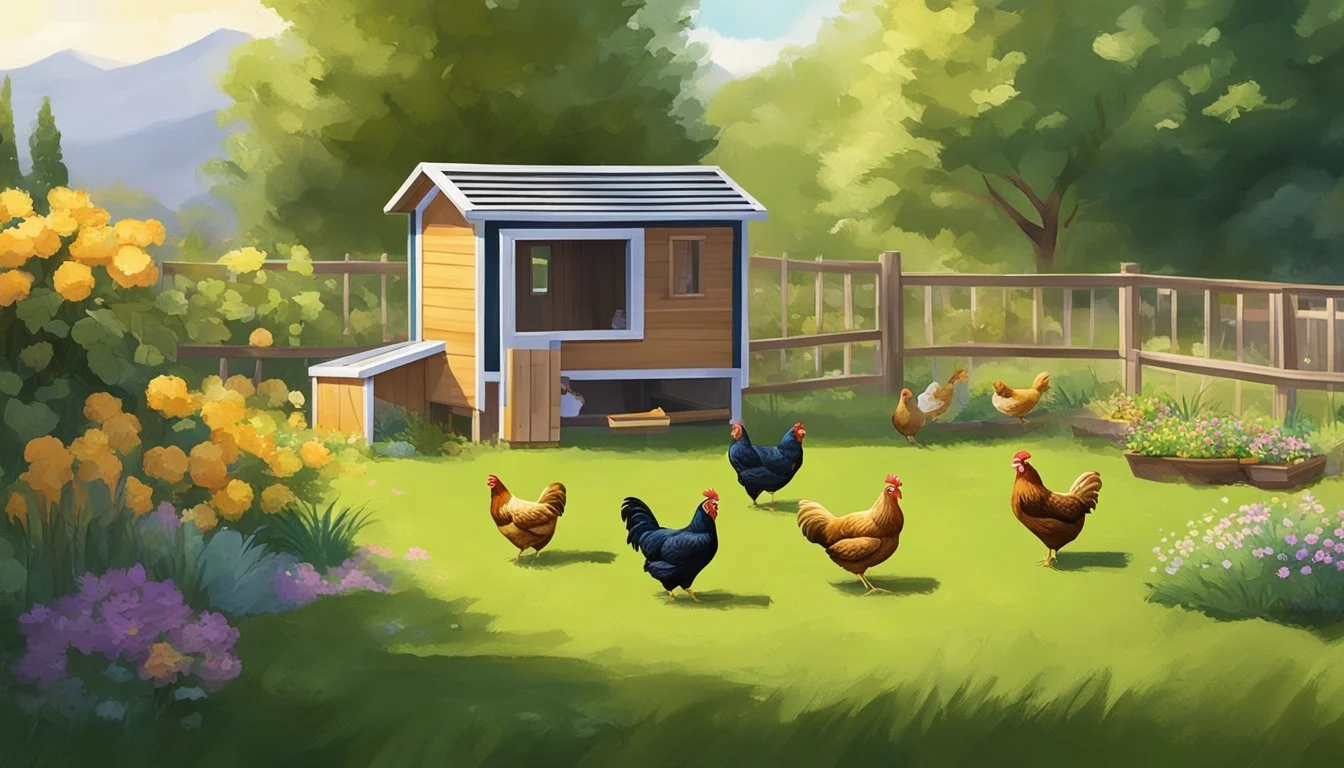Keeping Backyard Chickens in Reno, NV
Essential Tips for Urban Poultry Farming
In Reno, Nevada, the growing trend of raising backyard chickens allows residents to enjoy fresh eggs, natural pest control, and the pleasures of animal husbandry. The city provides specific guidelines to ensure that this practice is carried out in a manner beneficial to both the chicken owners and the surrounding community.
Residents of Reno are permitted to keep a defined number of backyard chickens under certain conditions to maintain harmony in residential areas. Roosters are not allowed due to noise concerns, and there are stipulations regarding the placement and upkeep of chicken coops. The coops must be set at a distance from public streets, parks, and schools, and they cannot be visible from the street, ensuring that the aesthetic of the neighborhood is preserved.
The city's regulations also emphasize the importance of maintaining sanitary conditions for the chickens. By preventing overcrowding and mandating clean living spaces for the birds, Reno aims to promote both the health of the backyard flocks and the public health of the community. These thoughtful rules reflect Reno's commitment to supporting urban agriculture while balancing the needs of its diverse residents.
Reno Chicken Ordinance Overview
The City of Reno, Nevada, has specific ordinances that regulate the keeping of backyard chickens. These regulations ensure the health and safety of both the chickens and the community.
Understanding the Local Laws
The City of Reno allows residents to keep backyard chickens subject to certain conditions to avoid nuisances and maintain public health. Residential areas are subject to maximum hen limits and coop placement restrictions. It is essential that residents familiarize themselves with these local regulations to comply with city ordinances:
Number of Chickens: A resident can keep up to 12 fowl, which may include chickens, ducks, geese, and turkeys.
Coop Placement: Coops must be situated at least 100 feet from public streets, parks, or schools. They are to be placed in the rear yard and must not be visible from the street.
Prohibition of Roosters: Roosters are not allowed within the city limits due to the noise they generate, which is considered a nuisance.
License and Permit Requirements
Regarding the licensing and permit needs for keeping chickens in Reno:
Permit Required: No permit is required to keep chickens as long as residents comply with the stipulated ordinances.
Coop Restrictions: Coops must be maintained on the owner's property, and overcrowding of chickens is prohibited to prevent inhumane conditions.
Residents are encouraged to contact City of Reno main contact number (775-334-INFO) for more information or clarification on chicken ordinances. Additional resources and dispatch support can be sought from Washoe County Dispatch Line (775-322-3647) or through the county's official website. It's imperative for residents to adhere to these regulations for the successful and lawful keeping of backyard chickens in Reno, Nevada.
Setting Up Your Chicken Coop
When establishing a chicken coop in Reno, NV, it's crucial to adhere to certain guidelines to ensure it remains both a safe habitat for the chickens and does not become a nuisance for neighbors. Proper design, location, and preventative measures are key for a successful backyard chicken environment.
Coop Design and Location
A chicken coop should be constructed within the confines of the owner's property, optimally positioned in the rear yard to minimize visibility from the street. The ideal design will provide a minimum of 2-3 square feet of space per chicken inside the coop to allow for natural behaviors. The outside roaming area should offer at least 8-10 square feet for each bird.
Coop placement guidelines include:
Minimum distance from public streets, parks, or schools: 100 feet
Visibility: Coops cannot be visible from the street
Not adhering to these placement guidelines can result in violations of city ordinances.
Ensuring Safety and Preventing Nuisance
To maintain security and prevent the coop from becoming a nuisance:
Restrict Overcrowding: Coops should not be overcrowded to prevent health issues.
Prohibit Roosters: Roosters are considered a nuisance due to their crowing and are not allowed in Reno.
Manage Waste: Regular cleaning of the coop is essential to prevent odors and attractants for predators or pests.
Good neighbor practices involve:
Regular Maintenance: Keeping the coop in good condition to prevent disrepair.
Communication: Informing neighbors about the coop can alleviate concerns and promote understanding.
By proactively managing these aspects of chicken care, owners can create a harmonious environment for both their backyard chickens and the surrounding community.
Chicken Care Basics
Successful chicken care in Reno involves providing adequate food, clean water, and regular health checks to ensure a thriving backyard flock.
Feeding
Chickens require a balanced diet consisting of proteins, carbohydrates, vitamins, and minerals. Start chicks on a starter feed, rich in protein to support their rapid growth. Adult chickens can be fed a layer feed which is optimized for egg production. It's essential to provide grit if they are not free-ranging, as it aids in digestion. Always use a feeder to keep the chicken feed clean and dry.
Hydration
Chickens need constant access to fresh water. Water containers should be cleaned regularly to prevent the spread of disease. During colder months, ensure that their water doesn't freeze over. In hotter weather, check water levels frequently, as chickens will consume more to stay hydrated.
Health Monitoring
Regularly observe your chickens for signs of disease or distress such as lethargy, abnormal droppings, or loss of feathers beyond normal molting. Isolate sick birds immediately to prevent the spread of illness. A healthy chicken is active, alert, and maintains a consistent appetite. Always consult a veterinarian if you suspect any health issues.
Chicken Breeds and Behavior
When keeping backyard chickens in Reno, NV, it's important to select breeds suited for the area's climate and adhere to local regulations concerning roosters.
Choosing the Right Breed
Backyard chicken owners in Reno should consider breeds like the Leghorn for their egg-laying abilities. Leghorns are hardy chickens that come in various colors, including white, brown, and black. They can lay around 280 to 320 eggs per year, making them an efficient choice for egg production. In Reno's varying climate, choosing breeds that can handle weather changes is critical. Fowl that can thrive in snowy conditions, as well as warmer weather, are ideal.
Understanding Rooster Regulations
Reno has specific regulations regarding roosters:
Prohibition: Roosters are not allowed within city limits to prevent noise disturbances.
Fines: Non-compliance with this regulation may result in fines or other penalties.
Owners should be aware that only hens are permissible, and keeping roosters, which often crow at sunrise and various times throughout the day, can lead to issues with neighbors and city officials. Therefore, residents must ensure they are only raising female fowl in their backyard coops.
Protecting Your Flock
To ensure the wellbeing of backyard chickens in Reno, NV, owners must address the challenges posed by potential predators and harsh weather conditions. Implementing safeguards can help maintain a healthy and secure environment for poultry.
Predators and Pests
In Reno, chickens may fall prey to a variety of predators such as foxes, coyotes, hawks, and domestic dogs. To deter these threats, a combination of physical barriers and vigilant practices is essential.
Physical Barriers:
Fencing: Ensure the enclosure is constructed with durable materials and buried at least 12 inches underground to prevent digging predators.
Covered Runs: Use wire mesh or solid roofing to protect chickens from aerial predators.
Vigilant Practices:
Regular Inspections: Check for signs of attempted entry and reinforce any weak points.
Secure Locking Mechanisms: Utilize locks or latches on coops and runs that cannot be easily manipulated by raccoons or other clever pests.
Weather Considerations
Reno experiences cold winters with occasional snowfall, which can impact poultry. Chickens require a dry and draft-free shelter to protect against the cold and ensure their comfort through the seasons.
Coop Design:
Insulation: Proper insulation retains heat within the coop without sealing it off completely, as ventilation is also crucial to prevent moisture buildup.
Elevated Coops: Raise coops off the ground to avoid snow accumulation and to provide an added layer of protection against ground-level predators.
Preventative Measures:
Monitor the condition of the chickens regularly for signs of frostbite or distress.
Provide a heat source if temperatures drop significantly, but ensure it is safe and does not present a fire hazard.
Community and Legal Considerations
Keeping backyard chickens in Reno, NV requires understanding and adhering to certain community norms and legal mandates. Residents must balance their hobby with neighborly etiquette and ensure that their activities align with the regulations set by local and state authorities.
Neighbor Relations
Maintaining good relations with neighbors is crucial for residents of Reno who wish to keep backyard chickens. Ensuring that chicken coops are not visible from the street and are kept at least 100 feet away from any public street, park, or school, as mandated by the city, can minimize potential disputes. Moreover, since roosters are prohibited in Reno due to noise concerns, adhering to this rule can help prevent fines and maintain neighborly peace.
Complying with County and State Laws
Residents of Reno should also be aware of the regulations that extend beyond city boundaries. For instance, across Washoe County which includes Reno, Sparks, and part of Las Vegas, backyard chickens must be kept within a secure enclosure. While Reno allows up to 12 fowl, other jurisdictions like Henderson, Las Vegas, and Carson City may have different limitations which emphasize the need for residents to verify with their specific city ordinances. Additionally, enclosures are typically required to be set back at least 10 feet from property lines. Noncompliance can result in fines or other penalties.
Residents can contact the City of Reno main contact number at 775-334-INFO for specific inquiries, while the Washoe Cty Dispatch Line at 775-322-3647 or the county website can offer guidance on broader county regulations. Local laws are subject to change, and it's imperative for residents to stay informed of the latest ordinances to ensure legal compliance.
Benefits of Backyard Chickens
Backyard chickens provide a range of advantages, from a steady supply of fresh eggs to companionship as feathered pets. These benefits resonate with many residents in Reno, NV, contributing to the popularity of urban poultry keeping.
Egg Production
The primary advantage of keeping backyard chickens is the ability to harvest fresh eggs. These eggs are often perceived as more flavorful and nutritious than store-bought varieties, largely due to the chickens' diet and living conditions. Compared to commercial eggs, those from backyard chickens in Reno may offer:
Fresher taste: Eggs are collected daily.
Potentially higher nutritional value: Possibly due to varied diets and free-range living.
Chickens as Pets
Chickens can also serve as personable pets, offering interactive experiences beyond egg production. They exhibit a range of behaviors that can be amusing and engaging for owners. Benefits of having chickens as pets include:
Companionship: Chickens are social creatures that can bond with their caretakers.
Educational experience: They provide learning opportunities about animal care and responsibility.
Keeping chickens contributes to a sustainable lifestyle by providing a source of fresh eggs and companionship, fulfilling the needs of many households in Reno, NV looking for a more self-sufficient way of living.
Advanced Topics
In this section, dedicated enthusiasts who have mastered the basics can explore the intricacies of breeding chickens and the business aspects of selling eggs and poultry. Both require a deeper understanding of regulation, poultry genetics, and market demands.
Breeding Chickens
Enthusiasts interested in breeding chickens in Reno must first be aware of the detailed regulations that govern such activities. Focusing on selective breeding practices, they should aim for desired traits such as temperament, egg-laying capabilities, and feather coloring. Maintaining detailed records of lineage and genetics is crucial for successful breeding. Breeders should also ensure that their chicken coops adhere to the local guideline requiring that coops be located at least 100 feet from any public street, park, or school.
Selling Eggs and Poultry
Individuals can engage in the sale of fresh eggs and poultry, but it is imperative that they comply with local food safety regulations.
Fresh Eggs: For selling eggs, one needs to ensure they are properly cleaned, graded, and stored to maintain freshness. Packaging should be labeled with relevant information regarding the source and date of packaging.
Poultry: When selling poultry, it is equally important to follow humane slaughtering practices and proper packaging to meet health standards.
A seller should be aware that market demands fluctuate and that pricing should be competitive yet fair, reflecting the quality of the fresh, locally-raised product they offer. It's also beneficial for sellers to create a customer base that appreciates the value of local, sustainably-raised poultry and eggs.
Resources and Further Reading
When exploring the regulations for keeping backyard chickens in Reno, Nevada, residents should consult a variety of resources to ensure compliance with local laws and best practices for poultry care.
Official City Resources:
City of Reno Contact: Residents may call the City of Reno main contact number at 775-334-INFO (4636) for inquiries.
Washoe County Dispatch Line: Questions related to county regulations can be directed to 775-322-3647, or resources can be accessed online at the Washoe County website.
Online Guides and Communities:
ChickenLaws.com: This website offers summarized information on chicken laws specific to Nevada and Reno, including coop restrictions and limitations on the number of chickens allowed.
Learn How to Raise Chickens: A site that provides detailed insights on chicken raising, coop requirements, and often local ordinances specific to areas like Reno.
Local Organizations:
Edible Reno-Tahoe: Area-based publication that occasionally features articles on urban farming, including raising backyard fowl.
For residents interested in further education on raising chickens, local farming supply stores and agricultural extension offices often provide workshops and detailed guides. Networking with local chicken owners through community groups or social media can also yield valuable first-hand advice and region-specific tips.










